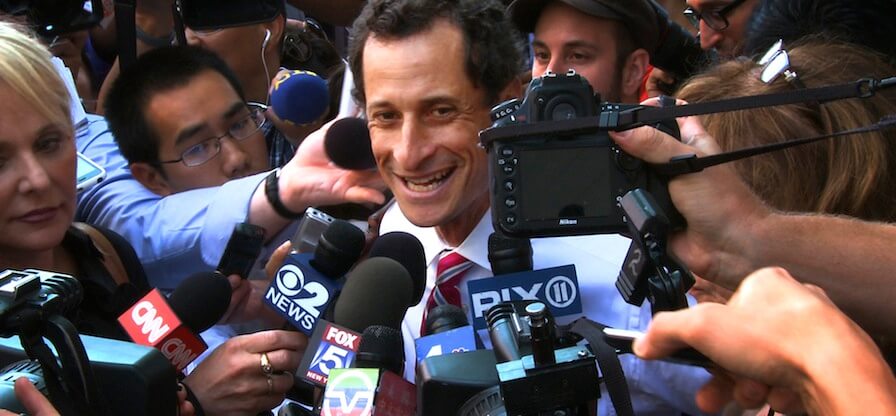‘Weiner’ Like a super-sized episode of “Veep” but real and just as funny, “Weiner” was there to witness the apocalypse that was Anthony Weiner’s mayoral bid to rule New York City — the one undone by the Carlos Danger business and its attendant ween pics. It’s been three years since his second epic flame-out, but instead of clarity we get only chaos. If anything the world seemed to have more of an idea of who Weiner was then than now: a wretched perv, reduced to a punchline so juicy even Wolf Blitzer got in a good joke. RELATED:Review: “Black Girl” is the deceptively modest film that launched African cinema “Weiner” isn’t so quick to judge. By turns a comedy of humiliation, a political satire and a Bergmanesque marital drama, it’s not an apologia so much as a clarification — proof that he’s a deeply, profoundly complicated figure, impossible to be judged good or bad. Here are three ways “Weiner” makes him seem more complex, if not always in ways he’d like: It reminds us he could’ve been great
Weiner’s campaign started off strong, but once more skeletons came skulking out of the closet, the media was quick to talk about them and nothing else. No matter what he did, and no matter how badly he handled the blowback, it’s despairing to watch Weiner field the same questions over and over. You feel bad for him, but you feel worse that no one’s talking about the real issues he struggles to bring up. When he first became a name, Weiner was a rock star — the people’s politician, who really cared about bullying the bullies, who didn’t mind acting like a jerk but for the side of good. RELATED: Interview: Russell Crowe talks “The Nice Guys” and stealing Ryan Gosling’s jacket In “Weiner,” that part of him still peeks out now and then. Late in, he magically regains his mojo, heading into a hostile Bronx round-up and winning everyone over to his side. We can’t be sure whether he’d have made a great mayor — he lacks fear but, also self-control. What makes him an appealing go-getter also makes him a menace; his passion can destroy the bad guys but it can also for destroy himself. Still, even if he’d been a powerful failure, at least he’d have been a lot more fun than Bloomberg. The film is a useful portrait of someone being destroyed
Movies — and our culture in general, and one of our current presidential nominees — tend to valorize the winners. If people aren’t doing so hot, it’s because we’ll eventually watch them overcome adversity. We don’t like to watch the losers, because that doesn’t make us feel good about ourselves. It also means we’ll be quick to pile on someone like Weiner, who was destroyed, and whose destruction was definitely partly his fault. And yet it’s harder to point and laugh or lodge accusations when you’re seeing the man himself suffering before your eyes. Weiner spends the majority of “Weiner” frazzled and exhausted, sometimes pathetic. When he tries to push back, it gets worse. We watch him blow up on pundits, then rewatch his outbursts on his iPad afterwards, half-horrified at his temper, half-proud. Movies, in that oft-quoted Roger Ebert line, are machines that generate empathy, and only a jerk would watch Weiner suffer on a movie screen and think he was nothing more than a horndog busted for sex scandals in which he had zero sex. RELATED: Review: “Maggie’s Plan” seems like a knockoff but it’s far weirder than that He’s a victim of himself and of the media (and media)
Weiner’s downfall could only happen this decade. He wasn’t a traditional leering politician; he was a guy whose latent tics were activated by a combination of technology — phones, social media — and sudden fame. That doesn’t excuse his actions, and “Weiner” never lets him off the hook. But it does diagnose rather than judge, and what we learn is that not only is Weiner damaged but so is our modern media complex. Other lessons from revisiting the second Weiner scandal are equally unpleasant. We’re easily prone to mob mentality. We like destroying people for our own entertainment. We like one-line jokes over nuance. We’re self-righteous, perhaps because we fear something like this happening to us. We’re short-sighted and we don’t think about the bigger picture. We think we’re helping someone like Huma Abedin by portraying her as a victim, not realizing that by doing so — and especially by saying things like “She’s a victim of spousal abuse,” as one pundit says — we’re adding to her already sizable humiliation. We thought by attacking Weiner we were revealing his seedy side. “Weiner” shows we also revealed our own. Follow Matt Prigge on Twitter @mattprigge
Directors: Josh Kriegman, Elyse Steinberg
Genre: Documentary
Rating: R
4 (out of 5) Globes
3 ways ‘Weiner’ shows Anthony Weiner to be (almost) sympathetic

IFC Films















